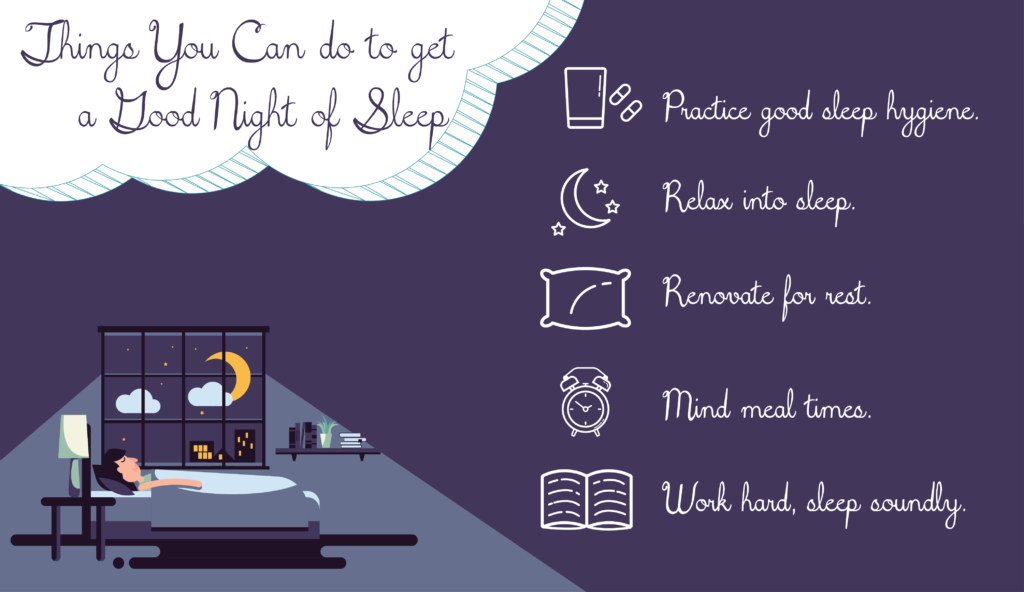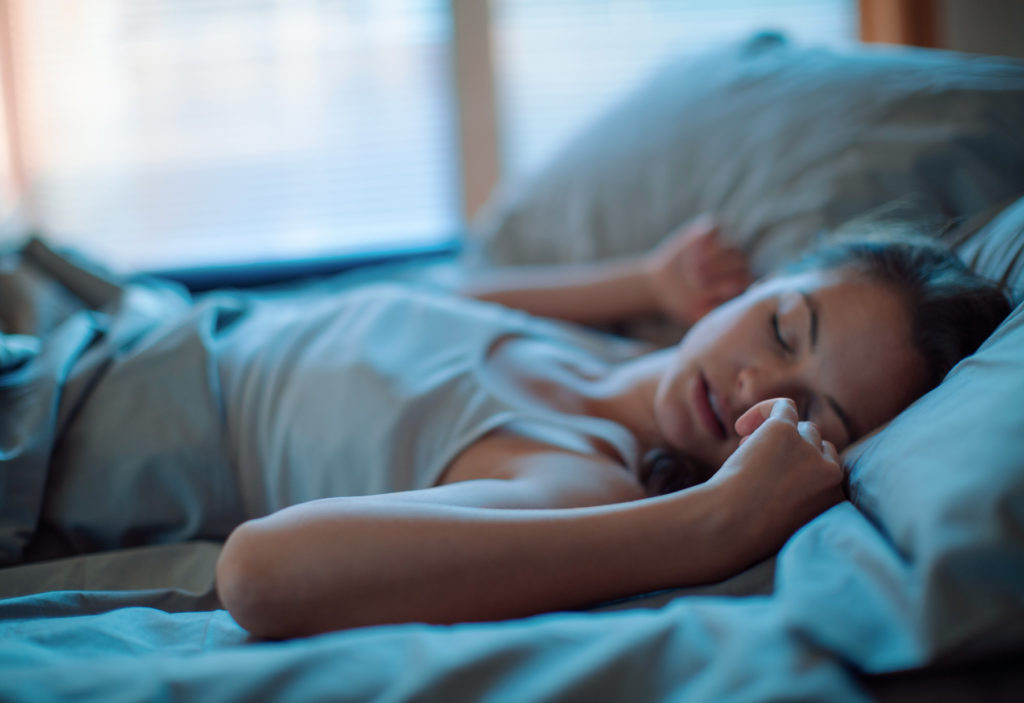While most people take the benefits of a good night’s sleep for granted, truly restful sleep is an important component to good health. Adequate sleep improves physical performance, cognitive function, and weight management. Getting consistent, high-quality sleep also supports emotional well-being, which is why one feels so rich after waking from a night of satisfying slumber. Here are eight ways to get that energized, alert feeling at the start of every day.
Key Points
- Practice good sleep hygiene.
- Relax into sleep.
- Renovate for rest.
- Mind meal times.
- Work hard, sleep soundly.
#1 Manage Your Sunlight
The light and warmth of the sun are signals to the human body that it’s time to wake up whether one is ready or not. According to a National Sleep Foundation study, teens may not be ready to greet the day until much later than other segments of the population. While teens need between eight and 10 hours of sleep per night, research shows that they naturally fall asleep later at night and wake up later in the morning than what is considered to be normal. Adjusting their school schedules to accommodate their natural sleep cycles is the ideal solution. It’s also helpful to furnish their bedrooms with blackout curtains that block sunlight from invading their space too early.
#2 Go to Bed When You Feel Sleepy
While it’s common for teens to be unable to fall asleep until after 11pm, nearly everyone has experienced this frustrating state of sleeplessness. The key to overcoming this challenge is to hold off on climbing into bed until one feels sleepy. Trying to force the body to fall asleep by tossing and turning in bed is ineffective and a waste of time. With proper planning, a person can learn to relax, fall asleep naturally, and get some work done in the process.
A stressful day at work or thinking about an important upcoming project can cause a person to be unable to fall asleep at a normal time. In these cases, one can do three activities to bring calm and induce sleep: read, pray, and journal.
Read. Traveling back in time with an historic fictional work is one way to escape the stresses of the day, temporarily forget about the challenges of tomorrow, and totally relax in the present.
Pray. Praying about problems helps people to acknowledge their needs and search for appropriate solutions. Sometimes just talking things out can inspire creative answers that bring real peace before bedtime.
Journal. Taking time to reflect on one’s day and to write about it’s good and bad aspects in a daily journal can help to relieve stress and promote faster sleep. After expressing gratitude for positive moments in the day, one can plan how to make the next day better and less stressful.
#3 Decorating for A Calming Bedroom
An environment that supports nourishing sleep can mean the difference between being the star at work or school and nodding off during an important meeting. Creating this kind of bedroom starts with a calming color scheme and an organized space. According to research that was published by the National Sleep Foundation, people who sleep in bedrooms that are painted in shades of blue get longer, better quality sleep. When the human eye sees this color, it sends a message to the brain that leads to a lower heart rate. You can find lots of blue bedroom ideas here.
Neutral colors such as beige, cream, gray, and light yellow have similar sleep-inducing effects. Fiery hues such as red, orange, and bright yellow have the opposite effect. To create a completely relaxing sleep sanctuary, one should remove busy wall art that may have splashes of these energizing colors. Decorating with subdued neutral colors such as those that are found in five-star spas helps one to create a calming bedroom that is needed for consistently good rest.
In addition to soothing colors, a relaxing bedroom is outfitted with plenty of discrete storage for better organization. An uncluttered, organized bedroom offers no distractions that impair sleep. Neutral-colored chest of drawers, dressers, and built-in cabinets deliver the storage space that is needed for a clutter-free room.
#4 Sleep in a Comfortable Bed
A comfortable sleep system is an essential ingredient to a good night’s rest. At a minimum, this setup includes a supportive mattress and quality, season-appropriate linens. According to many bed manufacturers, standard mattresses are made to last about 10 years. Older mattresses lose firmness making them less supportive for sleeping. Over the years, mattresses also collect dirt, dust mites, pet dander, and dead skin cells, which cause allergic reactions in some people. A new, clean mattress that is made from hypoallergenic materials greatly enhances sleep quality. Mattress types that fit the bill include adjustable air, premium foam, and natural rubber beds. Beds that are made from natural substances such as organic cotton and wool are also good choices.
Using seasonally inappropriate linens is a common problem that keeps people awake at night. Bedding that is too heavy causes uncomfortable sweating that leads to poor sleep during summer months. Covering a bed with sheets that are too thin during colder months brings on shivering and restlessness. Adjusting the home’s thermostat and using comfortable sheets contribute to sound sleep.
#5 Don’t Take Naps After 3PM
Productivity experts have touted the benefits of power napping for years. In fact, well-known companies such as Google, Cisco, and PricewaterhouseCoopers have incorporated nap rooms and nap chairs into their office spaces. A 20 to 30-minute nap after lunch may help to invigorate an employee before a late-afternoon meeting. A longer nap that is taken after 3pm, however, can destroy his or her chances of getting to sleep at a decent hour. A person who indulges in a long, post-3pm nap may also find it difficult to remain in a satisfying, deep sleep throughout the night.
#6 Don’t Eat Before Bedtime
Eating and drinking is as natural to humans as breathing. In modern times, food is abundant, and many people eat three or more times per day. This is much different from the way early humans nourished their bodies. Depending on their hunting and gathering skills, they may not have eaten every day. Eating takes up a lot of the body’s energy. Based on the types of food consumed, it takes between six to eight hours for meals to move through the first phases of digestion in the stomach, small intestine, and large intestine. If the body is still working hard to digest food, a person may not be able to fall asleep at a reasonable hour or slip into the deep sleep state that brings genuine rest according to Dr. Michael Breus, Board Certified Sleep Specialist. People who eat spicy foods before bed can develop indigestion or acid reflux, which also disrupts sleep.
#7 Settle Down Before Bedtime
A mind that’s still racing about the events of the day can hardly be expected to fall asleep without some coaxing. Many people wind down by reading bedtime stories to their little ones. Another way that a person can switch from active to sleep mode is to take a bath. A warm bath before bed helps to soothe the senses and promote sleep especially if the water is infused with essential oils such as lavender. After a bath, the simple act of putting on pyjamas or loungewear can send a signal to the mind to relax and get ready for bed.
Bathing and putting on special sleepwear will have little effect, however, if one is still plugged into work through smartphones, tablets, and laptops. People who want to fall asleep and stay asleep throughout the night turn off all electronic devices that are associated with work.
Listening to certain works of classical music have been proven to help with sleep. A 2006 study that was published by the National Center for Biotechnology Information concluded that classical music is an effective solution for sleep disorders. Pieces to try are Erik Satie’s Gymnopédie No.1, Chopin’s Nocturne No.2, Op.9, and Beethoven’s Moonlight Sonata.
#8 Stay Active During the Day
While exercising directly before bed can cause insomnia, getting vigorous exercise earlier in the day is practically a sleep tonic. This exercise can take the form of walking to the grocery store instead of driving there and taking the stairs rather than riding the elevator at work. One can also engage in intense exercise routines at the gym early in the day. Incorporating a healthy amount of fitness training into one’s day makes the body tired enough to drift off to sleep quickly and remain asleep throughout the night.
Conclusion
In today’s stress-ridden world, great sleep doesn’t just happen. People need a strategy. These eight tips help the average person to get the sleep that they need to live their best life.




